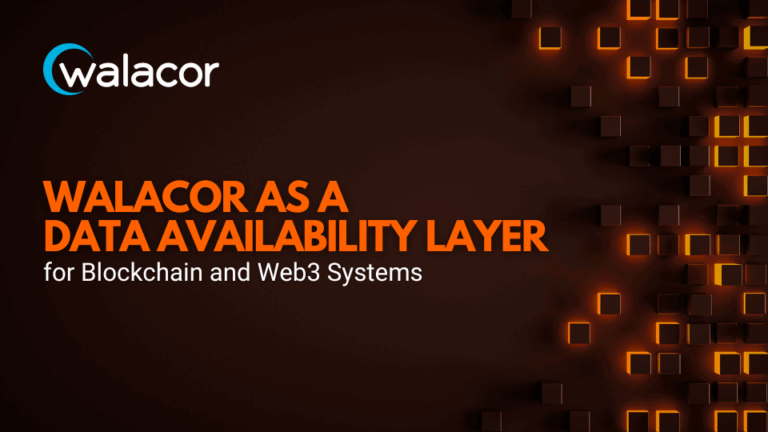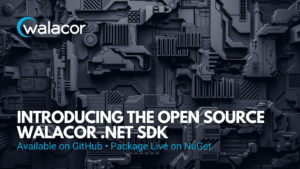
Data availability (DA) has become the linchpin of secure and scalable blockchain ecosystems. Whether you’re building rollups, zero-knowledge proofs, or decentralized applications requiring off-chain computation, how and where data is made available determines the trust model and integrity of the system.
Enter Walacor, a cryptographically verifiable data infrastructure purpose-built for modern digital systems. More than a storage platform, Walacor operates as a Software Node of Trust, and is positioned to serve as a DA layer for the next generation of blockchain and Web3 applications. It also acts as a bridge between Web2 and Web3, empowering developers to pull real-world data into blockchain environments with integrity and verifiability.
Walacor typically runs as a private or permissioned chain, offering organizations the ability to control who can write to or read from their instance. This architecture is ideal for enterprises, governments, and sovereign infrastructure that require verifiability without sacrificing privacy or compliance. In contrast, most public Web3 systems operate in open, permissionless environments. Rather than replacing public chains, Walacor complements them by serving as a verifiable data store, anchored to public blockchains like Solana when public auditability is required. This hybrid model allows builders to retain control over sensitive data while still exposing cryptographic proofs and verifiable references to public validators, provers, and smart contracts.
The Problem: Data Availability Bottlenecks
At the heart of every blockchain solution lies a simple question:
How can validators or provers verify a state transition if the data they need isn’t guaranteed to be accessible or trusted?
In Layer 2 systems, like optimistic rollups or zk-rollups, the execution layer lives off-chain. But the inputs and outputs of those computations must be published somewhere trustable so others can audit data state transitions independently. This is the role of a DA layer, to publish, prove, and persist application data such that all parties can reconstruct and verify the system’s state when needed.
Today’s DA options fall into three categories:
- Public L1s (Ethereum, Solana): Reliable but expensive and limited in scale.
- Dedicated DA chains (Celestia, Avail): Cheaper, more scalable, but still require trust in consensus.
- Roll-your-own IPFS or blob storage: Often fast and cheap, but lack verifiability, immutability, or guaranteed availability without substantial work under adversarial conditions.
Walacor’s Deliverables: Verifiable, Immutable, Available
Walacor rethinks the DA stack from the ground up.
Core Capabilities That Power DA:
- Immutable Object Store
Every object written to Walacor is cryptographically hashed and versioned. Lineage is tracked with a proof chain, enabling full reconstruction of historical states. - Real-Time Proof of Publication
As data is committed to Walacor, a proof is generated, including content hash, timestamp and author identity. These proofs can be anchored to public blockchain infrastructure (Bitcoin, Solana) for external attestation. - Decentralized Availability
Walacor supports multi-node replication and federated deployment, allowing DA guarantees to persist beyond the originator’s control. This resists censorship, node failures, or geopolitical disruption. - Efficient Data Retrieval for Verifiers and ZK Circuits
With structured indexing, low query latency, and native support for Verifiable Credentials and ZK-friendly formats (JSON canonical forms), Walacor makes it easy for circuits and provers to retrieve the exact data slice they need. - Web2 to Web3 Oracle Capabilties
Walacor is capable of ingesting data from APIs, enterprise databases, IoT sensors, or ML pipelines, then it hashes, timestamps, and stores the data with a cryptographically verifiable proof trail. This allows Web3 systems to reference real-world data, such as financial filings, environmental metrics, or identity attestations, with the assurance that it hasn’t been tampered with. In doing so, Walacor functions as a verifiable oracle provider, enabling smart contracts and zk-rollups to act on real-world inputs with trust and transparency.
DA Use Cases in Web3 Systems
Here’s how Walacor fits seamlessly into modern Web3 architectures:
- zkRollups & Prover Pipelines – Off-chain computation can store intermediate states and commitments in Walacor. Provers reference this data, and validators use Walacor to verify state transitions, without needing to store or download full state lineage locally.
- Decentralized Identity (DID) and Verifiable Credentials – Credential issuance and revocation logs must be persistently available. By publishing attestations to Walacor’s immutable ledger, projects gain auditable history without bloating L1s.
- Off-Chain Voting and Governance – DA is critical in reputation-based or token-weighted voting. Proposals, votes, and quorum proofs can be published to Walacor, ensuring future verification even if the frontend or API disappears.
- AI and Model Provenance – As on-chain and off-chain ML become more intertwined, projects must publish model versions, training sets, prompts and inferences in a way that’s publicly available and verifiable. Walacor provides a tamper-evident record for AI systems under human or DAO governance.
- Web2 Data as Verifiable Oracle Input – Projects can now reference real-world, off-chain data with confidence. Whether it’s pulling SEC filings into a DeFi compliance layer or using timestamped weather data in insurance smart contracts, Walacor enables smart contracts to act on off-chain inputs with verifiable integrity.
Why Choose Walacor Over Other DA Options?
Walacor offers a unique set of capabilities that outperform traditional data availability solutions across key dimensions:
- Immutability: Walacor enforces immutability at the data layer using cryptographic hashing and versioning. Unlike IPFS, which allows nodes to overwrite or unpin content, Walacor ensures that once data is published, its integrity and lineage are permanently verifiable. This puts it on par with Ethereum and Celestia for tamper resistance.
- Proof of Publication: Every object published to Walacor is accompanied by a cryptographic proof of publication that includes content hash, timestamp, and identity metadata. These proofs can be anchored to public chains like Bitcoin or Solana. Neither IPFS nor typical cloud storage providers offer this built-in audit trail. Celestia and Ethereum do provide on-chain publication, but at the cost of scalability or high fees.
- Read Access: Walacor provides fast, structured API access with optional access control, enabling real-time querying by validators, ZK circuits, or end users. In contrast, IPFS access depends on network availability and pinning, which may be unreliable. Celestia and Ethereum offer strong availability, but often at higher latency and cost.
- Write Access: Walacor allows for controlled and optionally encrypted data publication, which is essential in systems where provenance, permissioning, or selective disclosure are required. IPFS is public and uncontrolled by design. Ethereum and Celestia require transaction fees and consensus participation, making them less practical for high-throughput or granular data publishing.
- Cost Predictability: With Walacor, enterprises and protocols can plan for flat-rate or usage-based pricing, ensuring predictable costs even at scale. IPFS is generally free to write to, but incurs unpredictable retrieval costs when pinned by third-party nodes. Celestia and Ethereum rely on token-based economics, where network congestion and token volatility affect cost.
- Federation and Sovereignty: Walacor supports both distributed and sovereign deployment models, allowing developers, enterprises, and governments to run their own instance or connect to a federated backbone. Neither Ethereum nor IPFS offers true federated control. Celestia supports modular design but ultimately ties back to its validator set.
Plug Into the Future
If you’re building a high-integrity Web3 application, whether on Ethereum, Solana, or a sovereign zkVM, Walacor gives you:
- A durable, verifiable data layer
- Public auditability with private enforcement
- On-demand proofs of integrity
- Seamless interoperability with ZKPs and credentials
- Oracle support for verified Web2-to-Web3 data bridging
Ready to integrate Walacor as your DA layer?
We’re opening up SDK access for Web3 builders. Whether you’re building a rollup, issuing credentials, or constructing modular blockchains, Walacor is your node of trust.
Join our Discord to get started → https://tinyurl.com/walacor-discord


